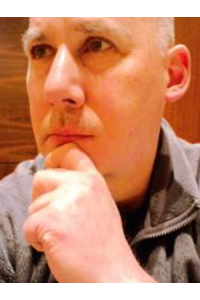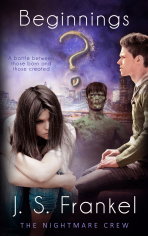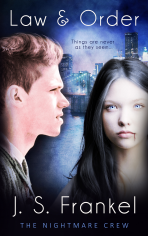Paul Wiseman, orphan and runaway, was looking for a family. He found one—and got a little more than he bargained for in the process.
Being an orphan is no fun. Having no friends isn’t much fun, either. When Paul Wiseman, seventeen, runs away from an orphanage to try his luck on the mean streets of New York, he finds himself trapped and almost beaten to death one night.
Rescued by a vampire named Angela, Paul goes to her small house in upstate New York where he meets her friends—Ooze, a sentient water being, Sandstorm, who uses his sandy body to blind his opponents, and CF—short for Cannon Fodder—a zombie.
The four of them become the Nightmare Crew—beings created by a scientist to fight against the lawless elements of the city. In joining them, Paul finds a family, friendship and maybe even love.
However, the company that allowed the creation of these beings wants them back, and they’ll stop at nothing to retrieve what they believe to be their property. It soon comes down to a battle between those born and those created…and it’s up to Paul to fight for the only family he’s ever known.
General Release Date: 24th May 2016
Night time, New York City, the Bronx
Paul Wiseman scavenged around the abandoned building for two things, clothes and food. This being a New York winter—the middle of January—it was friggin’ cold. He wore only a pair of cutoff jeans a size too small and a threadbare sweater over an equally threadbare T-shirt. The sneakers that covered his feet, soles worn and laces broken, weren’t enough to keep out the chill of winter. Additionally, the wind whistled its way through the holes in the building and made him shiver.
Cold, miserable and hungry, he kept up his search for anything to keep the chill out. Movements—four legs…but maybe two?—made him stop and listen. Anything on four legs didn’t bother him. Anything on two did. Aware of the potential for trouble should the two-legged variety find him, he kept as quiet as possible. If not the cops, then he had to watch out for gang members. Neither group was on his to-meet list.
The cement was cracked and uneven, and it caused him to trip as he awkwardly stumbled around in the darkness. He cursed as he fell over a crate and landed hard. A second later, he shut his mouth, fearful someone had heard him. Sitting up, he examined his knee. Blood seeped out of a gash and he wiped it away.
Another scratching noise made him freeze up and hold his breath. A second later, the intruder scampered out of the shadows and bolted for the door. It was a rat.
Breathing a sigh of relief, he got to his feet. Damn, that was close! Continuing his search, he spotted a bundle in the far corner. After getting to his feet and limping over, he hurriedly pulled the bundle open and…bingo! He found a hoodie and a pair of pants.
Yes, luck was on his side for a change. He hadn’t had much lately. At the age of seventeen-plus, he’d gone through a succession of foster homes from an early age onward, had miserable experiences with all of them, and finally ended up in an orphanage. There, at least he could get a high-school education, but even so, a high-school education didn’t get a person very far these days.
This was his second time taking flight from his home-not-really-a-home. St. Joseph’s, one of the orphanages operating in New York City, had taken him in at the age of ten. Located in the Bronx, it had served the community for many years.
It served as a place to stay, but Paul knew his time was limited. Initially, the head of the orphanage said he could remain…until the age of sixteen. Sixteen came and went and the orphanage, which relied on donations, got a sudden influx of cash from a few decent millionaires, and the people in charge changed the policy to eighteen.
After eighteen, though, he’d age out and be on the streets. Eight months shy of that not-so-magic mark and a one-way ticket out, he’d decided that he might as well get used to the homeless life.
The first time he’d got caught was at the age of fifteen, figuring they’d boot him out soon enough. He’d made the classic mistake of staying in a coffee shop at all hours of the day and someone eventually called the cops. In turn, they called the orphanage.
Brother Max, the director of the orphanage, a huge man in his forties with a large gut and a kindly—although at times world-weary—attitude, brought him back personally and scolded him in the administrative office.
Seated in a rickety hardwood chair, Paul glanced around. It was a dreary room with gray walls that housed a small desk, a leaky sink, a couple of file cabinets and a few chairs. It felt like a jail cell, not a whole lot different than his room.
“What’s the deal here?” asked Max with an aggrieved tone in his voice. “We’re trying our best for you. I admit this isn’t an ideal place, but it’s a whole lot better than being on the streets. You’ve seen the people out there. You know what it’s like.”
Having lived almost eight years behind these austere walls, Paul also knew what life was like there. It was a place where only the strong ruled and the kids didn’t care. They knew what was going to happen to them after they turned the not-so-magic age. “If you call getting your face smashed in every week fun, cool,” he said and couldn’t keep the bitterness from showing. “I’d call it something else.”
Max clasped his hands and tapped his forefingers together. It was his way of figuring out an answer. Paul just hoped that mention of a deity wouldn’t be involved. If there was a God, then He’d made Himself absent, for reasons unknown.
In the long run, it didn’t matter. What was done was done, and he’d deal. He’d dealt with a lot worse. He’d dealt with being ignored by his foster parents or beaten by them. He’d dealt with the other kids picking on him because he studied. He’d dealt with having no friends.
Most of all, he’d dealt with all of this crap because he had a dream of being someone and making it in this cruel and uncaring place called Earth…
Falling silent, he wondered for the umpteenth time why his parents had given him up. He didn’t recall his mother at all but had a picture of his father someone had given to him when he was around five. He couldn’t remember who’d given it, but it was special—a memory of home—and he always carried it with him.
It was like looking in a mirror. Both on the short and slender side of five-seven, they had the same mop of brown hair, brown eyes and a birthmark the size of a dime on the left cheek. Same looks, same hair… Paul shut the memories down, indistinct though they were. For all he knew, his parents were somewhere probably living the life of royalty, and he was here.
A gust of bitterly cold wind interrupted his trip down abandonment lane. He’d been on his own for almost a week. Social Services would probably find him sooner or later, but he was counting on the latter and not the former.
This time it would be different. He’d checked out all city maps, found the more desolate areas and memorized the places he thought were the safest. In addition, he planned on moving around as much as the inclement weather would let him. “It’s a big city,” he muttered. “Lots of people… They won’t find me.”
At first, it had been cool to come and go as he pleased and enjoy a measure of freedom. He’d spent the daylight hours ducking in and out of stores, sneaking into and sleeping in low-rent movie theaters and reading books in stores. From the way he acted, quiet and cool, keeping his head down and bothering no one, it had seemed he was invisible and he’d liked it that way—up to a point.















 Facebook
Facebook Twitter
Twitter